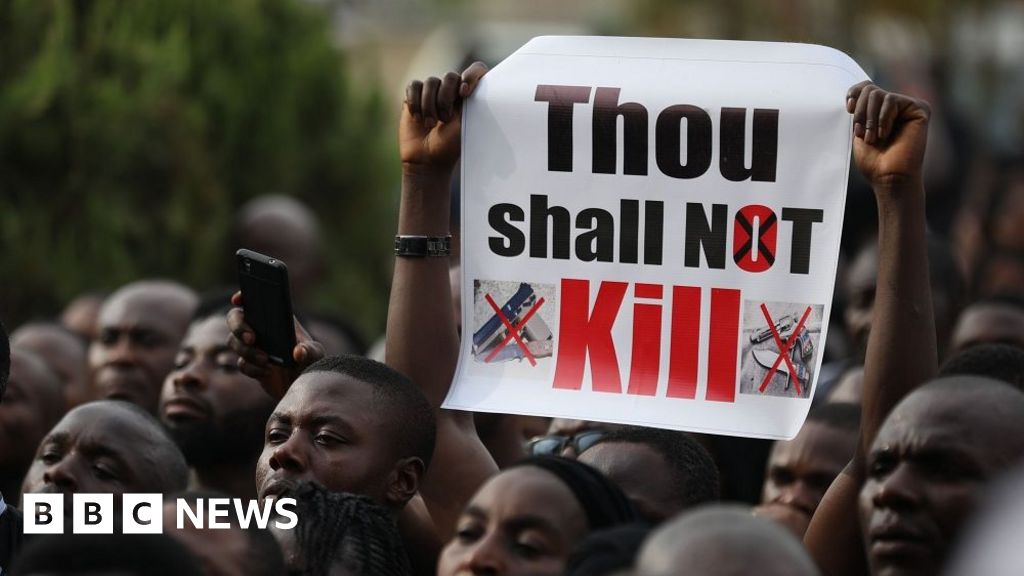Are Christians being persecuted in Nigeria as Trump claims?

Nigeria: Trump's Threat Over Christian Killings Amid Data Concerns
Former US President Donald Trump's recent threat to take action against Nigeria if it "continues to allow the killing of Christians" has reignited debate about the nature and scale of violence in the country. Trump's comments, made on Truth Social, echo allegations circulating in the US that Islamist militants are systematically targeting Christians. However, the accuracy of the data underpinning these claims is being questioned, raising concerns about the potential for misinformed policy decisions.
Disputed Figures Fuel US Concerns
For months, US politicians and campaigners have cited alarming figures regarding Christian deaths and church destruction in Nigeria. Senator Ted Cruz, for example, has stated that "since 2009, over 50,000 Christians in Nigeria have been massacred, and over 18,000 churches and 2,000 Christian schools have been destroyed." These figures, similar to those previously cited by media personalities like Bill Maher, have gained traction on social media and are shaping the narrative in some US political circles.
The Nigerian government has strongly refuted these claims, describing them as a "gross misrepresentation of reality." While acknowledging the existence of deadly violence, officials maintain that terrorists attack anyone who rejects their ideology, regardless of faith. They argue that portraying the conflict as solely targeting Christians ignores the broader context of insecurity and the suffering of Muslim victims as well.
The Source of the Data: A Closer Look
Much of the data cited by US politicians originates from reports by the International Society for Civil Liberties and Rule of Law (Intersociety), a Nigerian non-governmental organisation. Intersociety estimates that over 100,000 Christians have been killed by jihadist groups in Nigeria since 2009. However, the methodology and transparency of Intersociety's data collection have come under scrutiny.
The BBC's investigation revealed inconsistencies between Intersociety's reported figures and the sources it cites. For instance, a report on attacks in 2025 included media reports where the religious identity of victims was not mentioned. While Intersociety claims to conduct further analysis to determine the victims' background, the lack of detailed source information makes verification difficult.
“The challenge with relying solely on figures from organizations without transparent methodologies is that it can distort the reality on the ground,” explains Confidence McHarry, a senior security analyst at Africa-focused consultancy SBM Intelligence. “It’s important to consider multiple sources and contextualize the data within the broader socio-political landscape.”
Beyond Religious Conflict: Complex Drivers of Violence
The narrative of targeted Christian persecution often overlooks the complex and multifaceted nature of violence in Nigeria. While Islamist militant groups like Boko Haram and the Islamic State West Africa Province (ISWAP) pose a significant threat, other factors contribute to the insecurity, including farmer-herder clashes, banditry, and ethnic tensions.
The inclusion of Fulani herders as "jihadists" by Intersociety is particularly contentious. While the herders are predominantly Muslim, many analysts argue that the conflict is primarily driven by competition over land and resources, rather than religious ideology. These clashes affect both Christian and Muslim communities across Nigeria.
Christian Ani, a Nigerian security analyst, emphasizes the need for nuance. "To label the farmer-herder conflict as purely religious is a gross oversimplification. It’s more about access to resources and criminal elements exploiting the situation."
Alternative Data and Perspectives
Other organizations that monitor violence in Nigeria, such as the Armed Conflict Location & Event Data Project (ACLED), provide significantly different figures. ACLED estimates that just under 53,000 civilians, both Muslims and Christians, have been killed in targeted political violence since 2009. From 2020 to September 2025, they identified 384 incidents where Christians were specifically targeted, resulting in 317 deaths.
These contrasting figures highlight the challenges of accurately quantifying the impact of violence in Nigeria and the importance of relying on verified data and diverse perspectives. The potential for misrepresentation and the exploitation of sensitive issues for political gain underscores the need for careful analysis and responsible reporting.
The Path Forward
Addressing the complex security challenges in Nigeria requires a comprehensive approach that tackles the root causes of violence, promotes interfaith dialogue, and ensures accountability for perpetrators. While international attention and support are welcome, it is crucial that interventions are informed by accurate data, nuanced understanding, and respect for Nigeria's sovereignty. Trump's threat, based on potentially flawed information, risks further complicating the situation and undermining efforts to promote peace and stability in the region.
Originally sourced from: BBC News Africa
